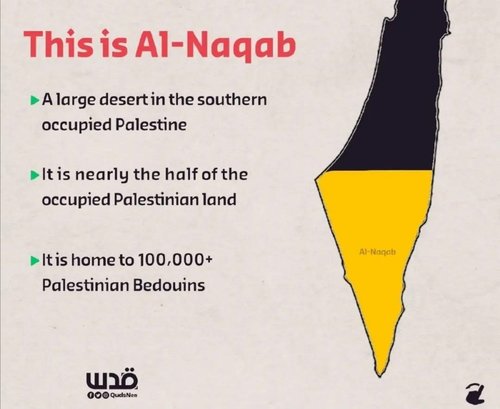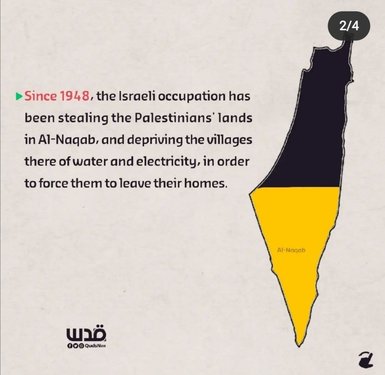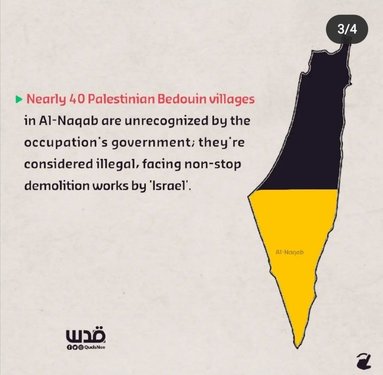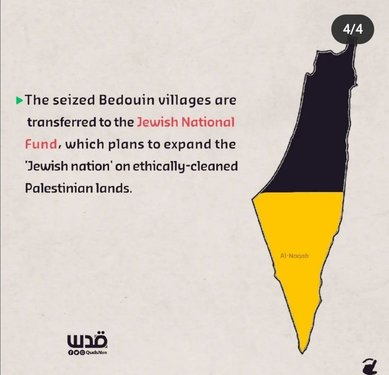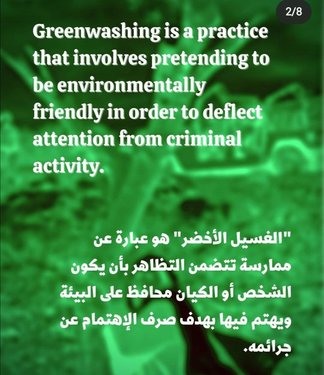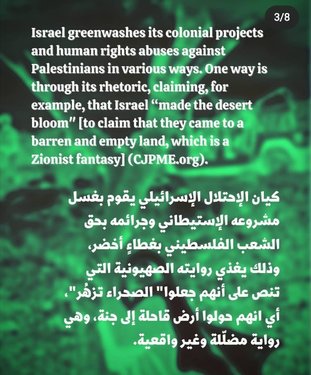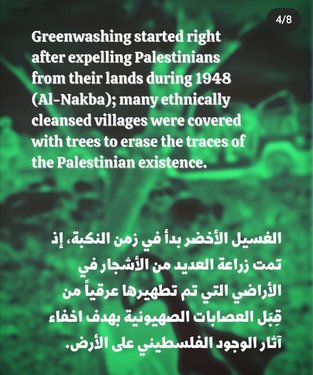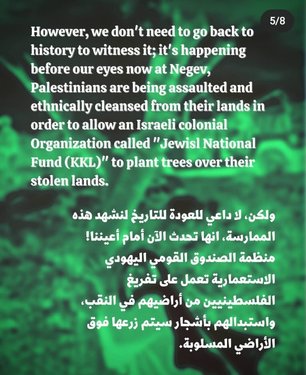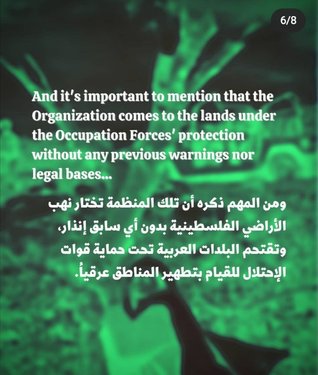-
Posts
8,459 -
Joined
-
Days Won
773
Content Type
Profiles
Forums
Events
Everything posted by ummtaalib
-
Sheikh Jarrah resident under threat of forceful eviction willing to die The Salhia family threatens to create an explosion with gas tanks, destroying the house, if the Israeli forces expel them, Sheikh Jarrah, Jerusalem. Since the morning, Israeli forces have been blockading the area in an attempt to expel the Palestinian family who has lived there for generations. The family was originally expelled from Ein Karem village, Jerusalem, in 1948 in favor of Israeli settlers. Mahmoud Salhiya, the owner of the house which is under threat of forceful eviction by occupation forces in Sheikh Jarrah neighborhood in the occupied city of Jerusalem said, "We are originally from Ein Karim, we aren't going to be displaced again, we will not leave here, either we die or we live" Updates here
-

MBS (Saudia): Friends of Zion (FoZ) Award
ummtaalib replied to ColonelHardstone's topic in General Islamic Discussions
Innaa lillaahi wainnaa ilayhi raaji'oon! What next from the "crown prince"? -
The Al-Naqab Desert ethnic cleansing Palestinian Al-Naqab desert is facing nowadays unprecedented ethnic cleansing attempts, massive arrests and repression campaigns by the IOF and the Jewish National Fund. What is Al-Naqab area? Quds News Network (@qudsnen) • Instagram photos and videos
-
Sheikh Abdul Qaadir Jeelani (rahimahullah) was a great Aalim and Wali of Allah Ta‘ala who lived in the sixth century of Islam. Allah Ta‘ala had blessed him with such great acceptance that many people reformed their lives at his hands. One salient quality that stood out in his life was the quality of truthfulness and honesty. Below is an incident that reflects this beautiful quality in his life which attracted the hearts of even the greatest sinners of his time: When Sheikh Abdul Qaadir Jeelani (rahimahullah) decided to tread the path of knowledge, he sought permission from his mother to travel to Baghdad where he would study under the leading Ulama of the time. His mother permitted him to leave and gave him forty dinars which she sewed into his kurta, beneath his armpit. At the time when she bid him farewell, she advised him to ensure that he always spoke the truth and never spoke lies. Sheikh Abdul Qaadir Jeelani (rahimahullah) took his mother’s advice to heart and promised her that he would always be truthful and would always conduct with honesty. Sheikh Abdul Qaadir (rahimahullah) thereafter joined a caravan of people traveling to Baghdad. During the journey, the caravan was waylaid by sixty robbers who looted the caravan, taking whatever wealth they found. Abdul Qaadir Jeelani (rahimahullah) mentions, “While looting the caravan, one of the robbers came to me, and thinking that I did not have any money, he asked me, ‘O pauper! How much of money do you have with you?’ I remembered the advice of my mother and replied, ‘Forty dinars.’ He then asked me, ‘Where is the money?’ I replied, ‘It is sewn into my kurta beneath my armpit.’ The robber was not convinced and thought that I was joking and therefore left me. “After a few moments, another robber came to me and asked me the same question, to which I gave the same answer. This robber also thought that I was joking and thus left me. Later on, both robbers went to their leader and informed him of what had transpired and mentioned to him that upon enquiring, I told them that I have forty dinars with me, concealed in my kurta. The leader said to them, ‘Bring him to me.’ “When they brought me to their leader, he asked me, ‘O young lad! How much of wealth do you have with you?’ I replied, ‘I have forty dinars.’ He then asked me, ‘Where is the wealth?’ I replied, ‘It is sewn into my kurta under my armpit.’ He was quite surprised and asked me, ‘What made you speak the truth and confess that you possess this wealth? (In other words, had you not informed us of it, we would have never known of it.)’ I replied, ‘My mother advised me to always be truthful, and I promised her that I will always speak the truth and will never lie. Hence, I did not want to break the promise which I made to my mother by speaking lies when you asked me regarding the wealth.’ “Hearing this answer, the leader was extremely affected and began to weep. He exclaimed, ‘You refuse to break the promise which you made to your mother, whereas I have been breaking my promise to Allah Ta‘ala for so many years by waylaying caravans and committing sins!’” Sheikh Abdul Qaadir Jeelani (rahimahullah) explains, “The leader then repented at my hands and pledged to never return to the sin of robbery and theft. When the other robbers witnessed his repentance, they addressed their leader saying, ‘We made you our leader in crime and robbery and followed you. Now we will make you our leader in repentance and taubah and follow you in this as well.’ They thus repented and returned all the stolen wealth to the caravan.” In this way, through firmly holding onto the quality of truthfulness and honesty, Sheikh Abdul Qaadir (rahimahullah) became the means for all sixty robbers to repent and change their lives. (Bahjatul Asraar pg. 186 and Qalaa-idul Jawaahir pg. 9) In the Mubaarak Hadith, Rasulullah (sallallahu ‘alaihi wasallam) has greatly emphasized the importance and virtue of truthfulness and honesty. Rasulullah (sallallahu ‘alaihi wasallam) said, “Hold firm to truthfulness (and honesty), for truthfulness leads one towards piety, and piety leads one towards Jannah. A person will continue to speak the truth and endeavor to always remain upon truthfulness (at all times), until he will be recorded as a siddeeq (extremely truthful person) by Allah Ta‘ala. Refrain from lies, as lies leads one towards sin, and sin leads one towards the fire of Jahannum. A person will continue to speak lies, and tries to remain upon this habit of speaking lies (at all times), until he will be recorded as a great liar by Allah Ta‘ala.” (Saheeh Muslim #2607) It should be borne in mind that truthfulness and honesty is not confined to speech. Rather, it applies to every dimension of one’s deeni and worldly life. When one is truthful, then he will fulfill every obligation and responsibility, whether it relates to his deeni or worldly life. In fact, truthfulness even surpasses the limits of merely fulfilling obligations and includes making an effort to show a higher degree of love and compassion to the creation, in the manner Rasulullah (sallallahu ‘alaihi wasallam) had taught the ummah to conduct. In essence, a true servant of Allah Ta‘ala is one who is loyal to Allah Ta‘ala at all times. He is constantly concerned about pleasing Allah Ta‘ala and taking care of His creation to the best of his ability, thereby exhibiting his loyalty to His Creator. The servant who brings these qualities in his life is honored and blessed with the rank of a siddeeq. The greatest of the Siddeeqeen was Hazrat Abu Bakr Siddeeq (radhiyallahu ‘anhu), whom Allah Ta‘ala had made the best example for the ummah to follow after the Ambiyaa (‘alaihimus salaam). His every word and action radiated this sublime quality to the highest level. In the upbringing of a child, it is extremely important for the parents to instill in the child the quality of being truthful at all times and being honest in his dealings. When this quality is deeply entrenched in the heart of the child, then throughout his life, no matter what situation he will be faced with, he will ensure that he fulfills the rights of Allah Ta‘ala as well as the rights which he owes to the creation. Furthermore, when this quality is enhanced in his life, then at every moment, he will be conscious about leading a pure life, internally and externally, and will be concerned about standing before Allah Ta‘ala and being held accountable for his actions on the Day of Qiyaamah. Therefore, every word that he will utter and every action that he will carry out will be in total harmony and conformity with the high levels of sidq (truthfulness). Hence, wherever he goes, he will be a beacon of light and a source of mercy for the entire creation. ihyaauddeen.co.za
-
How to Attain Khushuʿ 4: Soften Your Heart A sick, heedless and hard heart is one of the greatest reasons for the lack of khushūʿ in ṣalāh. When the heart is rectified, the actions are also rectified as the Messenger of Allah ﷺ said, “There is a lump of flesh in the body: when it is sound, the whole body is sound and when it is corrupt, the whole body is corrupt. Truly, it is the heart” (Bukhārī). Those with hardened hearts are condemned by Allah (‘azza wa jall): “So is one whose heart Allah has opened up for Islam and he is upon a light from his Lord (like one whose heart rejects it)? Then woe to those whose hearts are too hard to remember Allah. They have clearly lost their way” (39:22). In another āyah, Allah (‘azza wa jall) warns His believers of the hardening of the heart: “Has the time not come for those who have believed that their hearts should become humbly submissive at the remembrance of Allah and what has come down of the truth” (57:16)? And in the next āyah, Allah (‘azza wa jall) says, “Know that Allah gives life to the earth after its lifelessness. We have made clear to you the signs so that perhaps you will understand” (57:17). Ibn Kathīr (raḥimahullāh) explains how this āyah indicates that Allah (‘azza wa jall) softens hardened hearts, guides those who are confused after they were astray, and alleviates hardships after they have become unbearable. Just as Allah brings the dead dry earth back to life by sending down abundant rain, He also guides the hardened hearts with the proofs and evidences of the Qur’ān. By inserting the light of īmān into these hearts, these hearts are softened after previously being blocked. Therefore, do not give up. Even if you have struggled your entire life with khushūʿ, have hope and beg Allah (‘azza wa jall) to soften your heart and make it receptive to īmān, the Qur’ān and every form of good. How to Soften a Hard Heart a) Frequently remember Allah with your tongue & heart Allah (‘azza wa jall) says, “Truly it is in the remembrance of Allah that hearts find peace” (13:28). Dhikr is one of the greatest means of protecting a heart from hardening. This is because excessive talking about other than Allah is one of its leading causes. The Messenger of Allah ﷺ said, “Do not talk too much without the remembrance of Allah. Truly, excessive talking without the remembrance of Allah hardens the heart; and the furthest of people from Allah is the hard-hearted person” (Tirmidhī). The Messenger of Allah ﷺ said, “For everything there is a polish, and the polish of the heart is the remembrance of Allah” (Bayhaqī). Ibn al-Qayyim (raḥimahullāh) explains that the heart rusts like copper and silver. Moreover, just as the heart can rust, it can also be polished through dhikr, to the extent that it can shine like a crystal mirror. Thus, when one neglects dhikr, the heart rusts, and when one remembers Allah, it shines. There are two things which cause a heart to rust: heedlessness (ghaflah) and sin. Conversely, the heart can be polished by two things: dhikr and istighfār (seeking forgiveness). b) Avoid laughing excessively Excessive laughing hardens the heart. The Messenger of Allah ﷺ said, “Do not laugh excessively as excessive laughter deadens the heart” (Tirmidhī). c) Remember death frequently The heart of one who is heedless of death and has excessive hope is dead. The Messenger of Allah ﷺ said, “Frequently remember the destroyer of pleasures,” i.e. death (Tirmidhī). ʿAbdullāh b. ʿUmar (radiy Allāhū ‘anhumā) said, “I was with the Messenger of Allah ﷺ. A man from among the Anṣār came to him and greeted the Prophet. Then he said, ‘O Messenger of Allah, which of the believers is best?’ He ﷺ said, ‘He who has the best character amongst them.’ He said, ‘Which of them is the smartest?’ He ﷺ said, ‘The one who remembers death the most and is best in preparing for it. Those are the smartest’” (Ibn Mājah). d) Visit the graveyards and reflect on the situation of its residents The Messenger of Allah ﷺ said, “I used to forbid you from visiting the graves but (now) visit them, for it truly reminds you of the hereafter” (Tirmidhī). When ʿUthmān (raḍiy Allāhu ‘anhu) would stop at a grave, he would cry until his beard was soaked (in tears). It was said to him, “Paradise and Hell-fire are mentioned, and you do not cry, yet you cry because of this?” So he said, “Indeed the Messenger of Allah ﷺ said: ‘Indeed the grave is the first stage of the hereafter. So, whoever is saved from it, then what comes after it is easier than it. And whoever is not saved from it, then what comes after it is worse than it.’” He said, “And the Messenger of Allah ﷺ said, ‘I have not seen any sight except that the grave is more horrible than it’” (Ibn Mājah). e) Recite the Qur’ān Allah (‘azza wa jall) says, “We send down in the Qur’ān that which is a cure and mercy for the believers…” (17:82). Ibrāhīm al-Khawwāṣ (raḥimahullāh) said, “Five things cure the heart: reciting the Qur’ān with tadabbur (reflection), an empty stomach, the night prayer, humbly supplicating to Allah (‘azza wa jall) before dawn, and keeping the company of the righteous.” f) Feed the poor and stroke the head of the orphan A man once complained to the Messenger of Allah ﷺ about the hardness of his heart so the Messenger ﷺ said to him, “If you want to soften your heart then feed the poor and stroke the head of the orphan” (Aḥmad).
-
How to Attain Khushuʿ 3: Attain the Maʿrifah of Allah To attain khushūʿ, you have to push yourself to stop sinning by protecting your organs; in particular your eyes, tongue, and heart. Safeguard your eyes against looking at ḥarām, whether online or offline. Stop your tongue from backbiting, slandering, swearing, obscene language and saying hurtful things. Keep good company who will help you to protect yourself. Protect yourself from eating ḥarām food, including that which is earned from unlawful means. The īmān in your heart has a special nūr (light). The more nūr the heart has, the greater the nūr of your actions and words will be. Ibn al-Qayyim (raḥimahullāh) explains that there are some believers whose actions ascend up to Allah (subḥānahū wa taʿālā), and the nūr of their deeds is like the light of the sun. It shines brightly with the nūr from their hearts. The nūr will keep them steady on the ṣirāṭ (bridge over Hell-fire) and will guide them to Paradise. Of the various deeds, ṣalāh in particular is a ‘nūr’ as stated by the Prophet ﷺ (Muslim). Ṣalāh brings nūr in your heart; nūr in your face; nūr in your grave and nūr in the hereafter. Observe those who pray with complete khushū. You will notice that these people have abundant nūr on their faces. This is the same nūr which illuminates the heart and opens the doors of maʿrifah (knowledge) of Allah al- Nūr (The Ultimate Light). It is this nūr that also helps you to enjoy the sweetness of worship. Rust on Hearts This ‘nūr’ of the heart is extinguished through sins, especially the sins of the eyes. The sins block goodness and nūr from penetrating into the heart. This is why the Messenger of Allah ﷺ said, “Verily, when the slave commits a sin, a black dot appears on his heart. When he desists, seeks forgiveness and repents, his heart is polished clean. But if he sins again, it increases until it covers his heart. And that is the rān (rust) which Allah mentioned: ‘No indeed! Rather what they have been doing has rusted their hearts (83:14)’” (Tirmidhī). Ibn Rajab (raḥimahullāh) explains that the accumulation of rust on their hearts veils them from His maʿrifah (knowledge and deep awareness of Him), thereby, preventing them from becoming acquainted with Him. It hinders them from having vigilance (murāqabah) of Him (subḥānahū wa taʿālā), being mindful of Him and being aware of His presence in this world. The consequence of their hearts being veiled in this world is that they will be ‘veiled’ and blocked from seeing Him in the next. Hence why Allah says in the next āyah, “No indeed! They will surely be veiled on that Day from their Lord” (83:15). Sin after sin turns the heart into a sieve, preventing it from holding goodness. Unless you seek forgiveness and make sincere repentance, your heart will die. In this manner, praying ṣalāh with khushūʿ will become impossible, because a ‘dead’ heart cannot humble itself nor submit to its Master (ʿazza wa jall). Fighting your nafs and subjugating it is essential to attaining khushūʿ in ṣalāh. Ibn al-Qayyim (raḥimahullāh) explains that for a servant to remain present in his ṣalāh and to be occupied with his Lord, he must overcome his lust and desires. He asks, ‘How can a heart – which is overcome by lust, captivated by desires, and is a stronghold of shayṭān – be saved from whispers and distractions?’ Lowering the Gaze We should lower our gazes and stay away from looking at anything which incites lust, especially when we are browsing the internet. This includes being very selective of who we follow on social media. Likewise, we should lower our gazes when we are outside the home, walking in the streets and in the workplace. Al-Rabīʿ b. Khuthaym (raḥimahullāh) was so strict in keeping his gaze lowered that some people thought he was blind. For twenty years, he was a regular visitor to the house of ʿAbdullāh b. Masʿūd (raḍiy Allāhu ʿanhu). Whenever the maidservant would see him, she would remark to Ibn Masʿūd, “Your blind friend has come,” and Ibn Masʿūd (raḍiy Allāhu ʿanhu) would laugh at her remark. When Rabīʿ would knock on the door, the maidservant would go out and see him, head down and with his gaze lowered. When Ibn Masʿūd (raḍiy Allāhu ʿanhu) would see Rabīʿ, he would say, quoting the Qur’ān, “‘And give good news to the humble.’ (22:34). If Muḥammad ﷺ had seen you, he would have loved you.” Three Benefits of Lowering the Gaze Ibn al-Qayyim (raḥimahullāh) explains the benefits of lowering the gaze: 1. Tasting the sweetness and joy of īmān. This sweetness is far greater than the sweetness of what you averted your gaze from, because when you give up something for the sake of Allah (subḥānahū wa taʿālā), He replaces it with something far better. 2. The heart becomes illuminated, thereby increasing your insight (firāsah) as you are able to see through the light (nūr) of your heart what others cannot see. 3. It strengthens the heart, makes it steadfast, and makes one courageous.
-
Imaam Abu Haneefah (rahimahullah) was an illustrious Taabi‘ee and the founder of the Hanafi mazhab. He was born in the year 80 A.H. and passed away in the year 150 A.H. Imaam Abu Haneefah (rahimahullah) would spend the majority of his time in the worship of Allah Ta‘ala and the service of the knowledge of Deen. However, he was also a cloth merchant. He would use the profits earned to support his household, students of Deen and other ‘Ulama who were engaged in the service of Deen. Being a personification of Deen and the sunnah, the piety of Imaam Abu Haneefah (rahimahullah) was also reflected in his business dealings and the manner in which he conducted his trade. Below are two incidents which highlight the Islamic values he displayed while conducting business: First incident: On one occasion, Imaam Abu Haneefah (rahimahullah) sent a consignment of goods to his partner. Since the consignment included a cloth with a defect, he alerted his partner of the defect and instructed him to ensure that he revealed the defect to the customer before selling it. However, when the partner sold the cloth, he forgot to reveal the defect to the customer. Furthermore, he did not know the identity of the customer (so there was no way of contacting the customer and rectifying the mistake). When Imaam Abu Haneefah (rahimahullah) learnt of what had transpired, he gave the entire income from the sale of the consignment, which was thirty thousand dirhams (silver coins), in charity. Furthermore, (since his partner had not displayed the desired level of caution,) Imaam Abu Haneefah (rahimahullah) terminated the partnership. (Al-Khairaatul Hisaan pg. 44) Second Incident: A woman once came to Imaam Abu Haneefah (rahimahullah), looking to purchase a silken cloth. When he showed her a certain cloth, she said to him, “I am a weak woman, and it is amaanah, so please sell me this cloth for the amount that it cost you.” Imaam Abu Haneefah (rahimahullah) immediately said to her, “Take it for four dirhams.” The woman could not believe that Imaam Abu Haneefah (rahimahullah) was prepared to sell her the silken cloth for such a low price, and thus exclaimed, “Do not joke with me, as I am an old woman!” Imaam Abu Haneefah (rahimahullah) explained to her, “I purchased two cloths (together, for one price). I sold one of the two cloths for a price which covered the entire capital besides four dirhams. Hence, this cloth now remains with only four dirhams of the capital amount outstanding (i.e. I made so much of profit from selling the first cloth, that to cover my cost, I now only require four dirhams. Hence, the second cloth now only cost me four dirhams).” (Taareekhu Baghdaad vol. 15, pg. 494) Lessons: 1. Imam Abu Haneefah (rahimahullah) was worried and concerned about honesty and transparency in business dealings, hence he did not want a defective item to be sold to a customer without him being made aware of the defect, as this is impermissible. Thus, when the defective item was sold without the customer being alerted to the defect, he gave the entire income in charity. Though it was not necessary for him to give this entire amount, he did so in order to secure the pleasure of Allah Ta‘ala. 2. When Imaam Abu Haneefah (rahimahullah) saw that his partner did not display the desired level of concern and caution, he immediately terminated the partnership. He feared that to remain in partnership with such a person would be detrimental to his Deen. Hence, the concern for his Deen came first – before the concern for business and money. 3. When a Muslim conducts business and trade, his intention should not merely be to make money. Rather, together with making the intention to support his family with halaal livelihood, he should also intend to use his business to support and help people who are in need of assistance. In this manner, one’s business will become a means of earning reward from Allah Ta‘ala. Hence, when the old woman approached Imaam Abu Haneefah (rahimahullah) for help, he immediately assisted her. Though it resulted in him losing out on abundant profit, he knew that the reward that Allah Ta‘ala would bestow him with would be worth far more. UswatulMuslimah
-
Greenwashing A brief explanation about Israel's method of Greenwashing. It's happening now before our eyes in Al-Naqab! The Occupation eitherdestroys nature, or exploits it. [Via @adnan_barq]
-
Massive onslaught on the Bedoiuns of the Negev Desert Palestinian West Bank's dessert of Negev has been under massive onslaught by Israeli occupation forces that assaulted and arrested native Palestinian protesters demonstrating against Israel's ongoing bulldoze of lands as part of the Israeli tree-planting project. Video here: Quds News Network (@qudsnen) • Instagram photos and videos
-
Victory in Oldham: Elbit forced to sell Ferranti after sustained direct action campaign After 18 months of sustained direct action taken at the Elbit Ferranti site in Oldham, Greater Manchester, with 36 people arrested, Elbit have now sold Ferranti technologies, with its continued operation in Oldham appearing unfeasible. Activists have occupied, blockaded, smashed, disrupted, and protested regularly at the site, ultimately succeeding in ending the factory’s production of specialist military technologies for Israel’s fleet of combat drones. More information here
-
Gaza - The Palestinian hunters become the hunted It’s Gaza’s bird-catching season, when some Gaza residents earn a modest amount of money to help support their families by trapping exotic migratory birds along the border with Is-r.8el. But the problem, and a very deadly problem, is that the hunters have become the hunted. Israeli snipers target Gaza residents as they go about their work. The method Gazans use is a classic bird trapper’s ruse. A string tied to the legs of a captured bird acts as bait for others flying overhead. When they land on the ground, thinking there are worms to be had, a net is flipped over the birds. Simple but effective. But Israe8eli snipers lie in wait, overlooking the land where the birds are aplenty—in the heavily militarised and blockaded Gaza Strip along the border. Gaza has two bird trapping seasons—in the fall when several species of birds migrate from freezing #Europe to the #MiddleEast, and the second in May, during the breeding season of local #birds. Bird hunting is an old recreational practice for many but due to the difficult economic situation in Gaza, it helps provide a modest source of income for those who are unemployed. But it has become a dangerous activity. Anyone moving around in the be.s-1e-ged area can become a target of Israeli snipers. “Thirteen Gazans have been murdered by Israeli snipers while hunting birds in different areas along the borders since the second Intifada in 2000,” says Maher al-Tabbaa, a Gazan economic expert. In 2021, Mohamed Ammar, a Palestinian man, was shot dead while trying to capture goldfinches in the border area. He was said to be supporting a family of 10 and was the main breadwinner. He was shot in the back of the head by an Israeli soldier. An inhumane crime. While untangling net traps for migratory birds, Palestinian bird hunters know that an Israeli sniper can target them any time. 𝑨𝒓𝒕𝒊𝒄𝒍𝒆 𝒃𝒚: 𝑲𝒉𝒖𝒍𝒐𝒖𝒅 𝑹𝒂𝒃𝒂𝒉 𝑺𝒖𝒍𝒂𝒊𝒎𝒂𝒏 www.instagram.com/p/CYnseMUoE6P/
-
Israeli Crimes against the Elderly Last night, Omar Abdelmajid As'ad, an 80-year-old Palestinian man was on his way back home after a visit to his relatives in his hometown of Jiljilya, in the occupied West Bank district of Ramallah, when an ambush of Israeli soldiers stopped and arrested him and tied his hands to the back.The soldiers took him to a workshop in the village and embarked on beating him while he was handcuffed, according to witnesses.Nearly an hour later, a group of local Palestinian young men who accidentally passed by the workshop where the old man was being beaten were also attacked by the soldiers and detained in the same workshop with the old man, who had already been beaten for a while.As soon as the soldiers pulled out of the village and released them, including the old man, the young men noticed that As'ad was on the verge of death. And when they moved him to a nearby hospital, the old man had already passed away. An initial medical checkup to the deceased old man showed bruises across his body. Eye On Palestine on Instagram: "🇵🇸#Palestine | Last night, Omar Abdelmajid As'ad, an 80-year-old Palestinian man was on his way back home after a visit to his relatives in…" Sheikh Sulaiman Hathalin, a Palestinian elderly known for his activism in the anti-colonization movement in the West Bank province of Hebron, was run over and critically wounded about a week ago by an Israeli military vehicle at the entrance to Umm al-Kheir village. Eye On Palestine (@eye.on.palestine) • Instagram photos and videos
-

Women's Share in Inheritance half that of Men
ummtaalib replied to ummtaalib's topic in Answers to Misconceptions about Islam
Q. Please clarify the reason as to why the males inherit more than the females (Question published as received) A. The difference in inheritance is not based on the gender of the heir, but on three primary conditions: 1. The degree of kinship to the deceased: Regardless of whether the heir is male or female, the closer the relationship to the deceased, the more an individual will inherit. For example, a deceased woman’s daughter is entitled to half the inheritance while the husband of the deceased only receives one fourth. This is because the daughter, as an immediate blood relative, is closer in relation than the husband. Therefore the amount of inheritance she receives is greater. 2. The generation to which the heir belongs: Children usually receive more inheritance than parents because they will confront future financial responsibilities, whereas others usually maintain the financial upkeep of parents. The system functions this way regardless of gender. Even though they are both women, the daughter of the deceased inherits more than the deceased’s mother because they belong to different generations. Likewise, the daughter of the deceased inherits more than the deceased’s father. This is so even if she has a living brother who inherits with her. 3. Financial Responsibility: It is in this category alone that shares of inheritance differ according to gender. However, this disparity causes no injustice to the female. When a group of inheritors, such as the children of the deceased, are equal in the first two aforementioned factors, then their shares are affected by the third factor, i.e. financial responsibility. The Quran has not made the disparity between men and women a general condition, but rather has confined it to this specific situation. When the individuals in a group of heirs are equal in both their relationship to the deceased and their generation, the male receives twice as much as the female. The wisdom behind this arrangement is as follows: the male is responsible for the financial upkeep of his wife and children, whereas the female’s financial upkeep is the responsibility of an individual other than herself, such as her husband or father. Thus, for all practical purposes, the disparity favours the woman because the wealth she inherits is not applicable to the household expenses and is hers to dispense with as she pleases. Unfortunately, few today understand this finer point of the Islamic inheritance system. And Allah Ta’ala Knows Best Mufti Ismaeel Bassa Mufti Moosa Salie (The answer hereby given is specifically based on the question asked and should be read together with the question asked. Islamic rulings on this Q&A newsletter are answered in accordance to the Hanafi Fiqh unless otherwise stated.) Fatwa Department Jamiatul Ulama (KZN) Council of Muslim Theologians -
Not just neglect but too much pushing towards deen (especially with harshnesss) also leads children away from the right path
-
Manara Counseling Aisha Chaudhry Registered Mental Health Counselor Intern, MA, RMHCI As a Muslim therapist, Muslim women usually contact me for identity and self-esteem struggles, depression, anxiety, and anger issues due to overwhelm, postpartum balance, or conflict. Some women are facing infidelity or polygamy (being second wives) that brings changes to life. While others struggle with OCD and trauma. Relief can come from even difficult experiences. Parenting can be easier and a little more pleasurable. Whatever your struggle is, I will provide open space free of judgement. All you need to bring with you is courage, consistency, and persistence. Along with carefully listening to your story, I will help you identify limiting core beliefs, attachment style, and behavioral response patterns. I have successfully treated individuals with trauma, enmeshed family systems, OCD, depression, anxiety, and personality disorders.
-
Islamic counselling Sukoon Healing Afshan Khan is an Islamic counsellor, NLP life coach, CBT Therapist, Youth Mentor, Parenting Advisor and a Marriage Counsellor who provides Islamic counselling and mediation service for Muslims. Need someone to discuss, safely and in a confident environment, issues and problems? Afshan provides counselling to those in need, assisting in exploring and resolving difficulties, clarifying issues of distress, conflict, bereavement and other related matters.
-
-
Reciting Durood before Making Dua عن عبد الله بن مسعود قال إذا أراد أحدكم أن يسأل فليبدأ بالمدحة والثناء على الله بما هو أهله ثم ليصل على النبي صلى الله عليه وسلم ثم ليسأل بعد فإنه أجدر أن ينجح (المعجم الكبير للطبراني، الرقم: ٨٧٨٠، ورجاله رجال الصحيح إلا أن أبا عبيدة لم يسمع من أبيه كما في مجمع الزوائد، الرقم: ١٧٢٥٥) Hazrat Abdullah bin Mas’ood (radhiyallahu ‘anhu) has mentioned, “When any of you intends to make dua to Allah Ta‘ala, then he should commence his dua by praising and glorifying Allah Ta‘ala with praises that are befitting His majesty and honour. He should then send Durood (salutations) upon Nabi (sallallahu ‘alaihi wasallam), and he should thereafter make dua, as (through following this method of making dua,) it is more likely that he will be successful (in his dua being answered).” Ihyauddeen.co.za
-
TO WHAT EXTENT CAN A PERSON INTERACT WITH A POTENTIAL SPOUSE? Question: I have a few questions regarding the marriage process. 1. Is it permissible for me to get to know a girl with the intention of marriage? (i.e. texting, video calling, meeting in person) 2. My friends say that it is permissible if the girl involves her mehram (i.e. brother) as a chaperon in the process? As example, a WhatsApp group is created and I add her and her brother and then we chat with each other in the group in the presence of her mahram. Or if I meet her in person at some public place (i.e. cafe) and she is accompanied with her brother. 3. If not, what would be the permissible way to get to know someone within the boundaries of Shariah? As some of the parents in the western countries, have no connections in the community, therefor many single people use Muslim marriage apps to find spouse. Where the prospect is totally stranger and it’s difficult to commit in a relationship of marriage without a clear picture. 4. What's the ruling of texting/calling after engagement? Answer: In the Name of Allah, the Most Gracious, the Most Merciful. As-salāmu ‘alaykum wa-rahmatullāhi wa-barakātuh. In principle, it is not permissible for a person to unnecessarily speak with a non-mahram woman. Shariah has closed all doors that may lead one to commit illicit sins. If a person wishes to marry someone then it is permitted, rather recommended, to look at a potential spouse before marriage provided one is seriously contemplating marriage. See the following hadith: عَنْ أَبِي، هُرَيْرَةَ قَالَ كُنْتُ عِنْدَ النَّبِيِّ صلى الله عليه وسلم فَأَتَاهُ رَجُلٌ فَأَخْبَرَهُ أَنَّهُ تَزَوَّجَ امْرَأَةً مِنَ الأَنْصَارِ فَقَالَ لَهُ رَسُولُ اللَّهِ صلى الله عليه وسلم " أَنَظَرْتَ إِلَيْهَا " . قَالَ لاَ . قَالَ " فَاذْهَبْ فَانْظُرْ إِلَيْهَا فَإِنَّ فِي أَعْيُنِ الأَنْصَارِ شَيْئًا " . Abu Huraira (Allah be pleased with him) reported: I was in the company of Allah's Messenger (Sallallahu Alayhi Wasallam) when there came a man and informed him that he had contracted to marry a woman of the Ansar. Thereupon Allah's Messenger (Sallallahu Alayhi Wasallam) said: Did you cast a glance at her? He said: No. He said: Go and cast a glance at her, for there is something in the eyes of the Ansar. (Muslim 1424) عَنِ الْمُغِيرَةِ بْنِ شُعْبَةَ، أَنَّهُ خَطَبَ امْرَأَةً فَقَالَ النَّبِيُّ صلى الله عليه وسلم " انْظُرْ إِلَيْهَا فَإِنَّهُ أَحْرَى أَنْ يُؤْدَمَ بَيْنَكُمَا " . Bakr bin Abdullah Al-Muzani narrated that: Al-Mughirah bin Shu'bah proposed to a woman, so the Prophet (Sallallahu Alayhi Wasallam) said: "Look at her, for indeed that is more likely to make things better between the two of you." (Tirmidhi-1087) If a person is interested in marrying a girl, he should see her and enquire about her from her Mahrams and any other possible avenue. He should thereafter make Istikhara. The girl should also adopt the same procedure. This is in keeping with each other’s dignity, respect and honour. It will not be permissible to interact with a potential spouse by speaking, texting or video calling her. The purpose of looking at a potential spouse is to ascertain their physical appearance and beauty not their character and lifestyle. The most effective method of ascertaining the character and lifestyle of a prospective spouse is through their relatives and other associates. In regards to speaking with one’s fiancé, according to Shariah, an engagement is merely an agreement that the parties will marry in the future. It does not change the fact that the engaged couple are both strangers for one another before marriage. Therefore, it will not be permissible to interact with one’s fiancé, whether this is over the phone, e-mail etc. And Allah Ta’āla Knows Best Checked and Approved by, Mufti Ebrahim Desai (Rahimahullah)
-
Above information from DCIP Defense for Children International - Palestine (DCIP) is an independent, local Palestinian child rights organization dedicated to defending and promoting the rights of children living in the West Bank, including East Jerusalem, and the Gaza Strip.
-
Children used as Human Shields International humanitarian law explicitly prohibits parties to a conflict from directing "the movement of the civilian population or individual civilians in order to attempt to shield military objects from attacks or to shield military operations." An October 2005 ruling of the Israeli High Court of Justice also prohibits the practice. Despite this, DCIP has documented numerous cases where Israeli forces have used Palestinian children as human shields during ground operations. In 2014, a 16-year-old Palestinian boy was forced at gunpoint to search tunnels in the Gaza Strip for five days during Operation Protective Edge. During this time, he was interrogated, verbally and physically assaulted, and deprived of food and sleep. At least seven children between nine and 17 years old were used as human shields by Israeli forces in the Gaza Strip during the Israeli military offensive known as Operation Cast Lead in December 2008 and January 2009. Palestinian Children recruited as Informants The primary manner in which Israeli forces seek to recruit Palestinian children is as informants, usually during interrogations. Informants are recruited to monitor and disclose information to Israeli authorities about the activities of people living in their community. This can include providing the names of children who have thrown stones. Attempts to recruit often involve the use of threats and inducements, such as revoking a family member's work permit or a financial reward or even early release, in exchange for information. In addition to violating international laws, such attempts violate Israeli law. Due to the sensitive nature of this issue within Palestinian society, the scale of the problem is unclear, as both children and adults may refuse to discuss the matter, fearing ostracization or punishment by their communities.
-
Military Detentions Palestinian children in the occupied West Bank, like adults, face arrest, prosecution, and imprisonment under an Israeli military detention system that denies them basic rights. Since 1967, Israel has operated two separate legal systems in the same territory. In the occupied West Bank, Israeli settlers are subject to the civilian and criminal legal system whereas Palestinians live under military law. Israel applies civilian criminal law to Palestinian children in East Jerusalem. No Israeli child comes into contact with the military courts. Israel has the dubious distinction of being the only country in the world that automatically and systematically prosecutes children in military courts that lack fundamental fair trial rights and protections. Israel prosecutes between 500 and 700 Palestinian children in military courts each year. Since 2000, Israeli military authorities have detained, interrogated, prosecuted, and imprisoned approximately 13,000 Palestinian children, according to estimates by DCIP. Ill-treatment in the Israeli military detention system remains “widespread, systematic, and institutionalized throughout the process,” according to the UN Children’s Fund (UNICEF) report Children in Israeli Military Detention Observations and Recommendations. An average of 257 Palestinian children aged 12-17 years old were detained by Israeli authorities at any one time between 2014 and 2019, based on data released by the Israel Prison Service (IPS). During this period, an average of 48 young Palestinian children (12-15) were detained. Children typically arrive to interrogation bound, blindfolded, frightened, and sleep deprived. Children often give confessions after verbal abuse, threats, physical and psychological violence that in some cases amounts to torture. Israeli military law provides no right to legal counsel during interrogation, and Israeli military court judges seldom exclude confessions obtained by coercion or torture. A child is considered any person under 18 years, according to international norms. Between January 1, 2014 and December 31, 2019, DCIP collected sworn affidavits from 752 child detainees, describing their arrest, interrogation, and detention experiences. Of these, over half were arrested at night 87% were not informed of the reason for their arrest 95% had their hands and feet bound 84% were blindfolded 72% were subjected to physical violence 61% were subjected to verbal abuse, humiliation, or intimidation during or after their arrest 48% were transferred from the place of their arrest on the floor of a military vehicle 75% were strip searched 46% were denied food and water 32% were denied access to a toilet 70% were not properly informed of their rights 96% were interrogated without a family member present 52% were shown or made to sign a paper in Hebrew, a language most Palestinian children do not understand 35% were threatened or coerced 21% were subjected to stress positions 18% were detained in solitary confinement for interrogation purposes for a period of two or more days In 1991, Israel ratified the United Nations Convention on the Rights of the Child (CRC), which stipulates that children should only be deprived of their liberty as a measure of last resort, must not be unlawfully or arbitrarily detained, and must not be subjected to torture and other cruel, inhuman or degrading treatment or punishment. Despite various degrees of engagement by U.N. human rights bodies including the Committee on the Rights of the Child, the Committee Against Torture, the U.N. Working Group on Arbitrary Detention, as well as the Special Representative of the Secretary-General on Children in Armed Conflict, and numerous governmental and non-governmental organizations, Israeli authorities have persistently failed to implement practical changes to end its unlawful practices towards Palestinian child detainees. Reforms undertaken thus far have been largely cosmetic rather than substantive. Source
-
Child Fatalities & Injuries DCI-Palestine has been documenting Palestinian child fatalities and injuries at the hands of the Israeli military and settlers in the Occupied Palestinian Territory since September 2000 Fatalities In the West Bank, child fatalities generally occur in the context of military incursions, demonstrations against Israeli settlements or the separation barrier, or as a result of settler attacks against Palestinian children. In the Gaza Strip, the majority of child fatalities are the result of Israeli forces' attacks and full-scale military offensives, which cause a high number of civilian casualties. In recent years, Israeli forces have increasingly shot and killed Palestinian children with live fire near the Gaza border fence during mass demonstrations. Injuries Like fatalities, injuries in the West Bank occur as a result of military incursions, demonstrations, and settler violence. Injuries are frequently sustained when children are arrested, transferred, and detained in interrogation centers or prisons. In the Gaza Strip, injuries are most commonly the result of flying shrapnel produced by Israeli airstrikes or shooting at the border fence.
-
Disrupting Education In the West Bank, education is compulsory for children under 15. However, Israel’s network of military checkpoints impedes the movement of all Palestinians, meaning that otherwise short journeys can take several hours. For Palestinian children that must pass through Israeli military checkpoints to reach school, this results in missed class time, as well as subjecting children to violence, intimidation, and arbitrary arrest as children must interact with Israeli military personnel on their way to school. Palestinian children living near illegal Israeli settlements in the occupied West Bank report being subject to harassment and violence from Israeli soldiers and settlers as they travel to and from school. Settlers have also been known to attack schools with weapons and stone-throwing during the school day, creating an environment of fear at school that can impede the ability of children to learn and play.Israeli forces' attacks on schools and other education-related incidents, including attacks on educational personnel, threats of attacks, military use of schools, and other interferences with education, significantly impacted Palestinian children's right to access education. In 2019, the United Nations documented 257 education-related incidents in the occupied West Bank, including East Jerusalem, and the Gaza Strip that impacted children's right to access education. Repeated Israeli military offensives on the Gaza Strip have severely damaged its educational infrastructure, including through the targeting of United Nations-run schools. In the last major military offensive on Gaza in 2014, Operation Protective Edge, Israel damaged at least 232 schools and destroyed 29 others.Israel’s protracted closure of the Gaza Strip prevents essential materials for rebuilding damaged schools and constructing new facilities from entering the Gaza Strip, as well as learning materials. Fuel restrictions and poverty caused by the closure also prevent children from concentrating at school and some children drop out of school altogether as a result. Frequent power cuts force many Palestinian children in the Gaza Strip to complete their schoolwork by candlelight. Near-complete closure also prevents young people from leaving the Gaza Strip to study elsewhere, including children and young people who have acquired scholarships abroad. Access to Healthcare Palestinian children are denied access to health care and their right to health is negatively impacted due to Israeli closure policies, prolonged military occupation, and repeated military offensives. Palestinian children are unable to access sufficient healthcare in the Gaza Strip, including many children left permanently disabled and with long-term trauma following Israel’s repeated military offensives on the Gaza Strip. Israel’s closure of the Gaza Strip has plunged Gaza’s health sector into crisis. The closure restricts essential and lifesaving medical and pharmaceutical resources from entering the Gaza Strip as well as patients and companions leaving Gaza. Israeli authorities have maintained strict restrictions on travel to and from the Gaza Strip, as well as the import of vital materials, and the export of goods, blighting the economy. Egypt, too, has kept its crossing with the Gaza Strip in Rafah closed for the most part since 2013, opening it only intermittently. Repeated Israeli military offensives, including three particularly devastating ground and aerial assaults in 2008-2009, 2012, and 2014, devastated the Gaza Strip's infrastructure, including its healthcare system. This regular obliteration of Gaza’s infrastructure, combined with Israel’s closure policy, has created a human-made humanitarian crisis characterized by acute water and electricity shortages, further compromising the health of patients, who cannot expect treatment in sanitary conditions, or for vital and lifesaving electricity-powered machines to run without interruption. In 2018, when back-up generators failed at the Pediatric Specialized Hospital in Gaza City, medical teams had to manually ventilate four children until the machinery was fixed. Between Israel’s decade-long closure limiting the entry of pharmaceuticals, medical equipment, and specialized staff, and large-scale damage to medical infrastructure during Israel’s 2014 offensive, some treatments are now entirely unavailable in the Gaza Strip. Israeli closure policies prevent disabled Palestinian children from accessing resources that would enable them to live a full life, and traumatized children from accessing the psychosocial support they need to recover. Children who require medical treatment that cannot be provided within Gaza are frequently denied permits by Israeli authorities to leave Gaza. Palestinian children & Armed Conflict Palestinian children in the Gaza Strip are at risk of violence, including accidental violence, as a result of Palestinian armed group activities; and Israel’s ongoing blockade of the Gaza Strip has created an acute, human-made humanitarian crisis and deteriorating economic context within which children may be more vulnerable to recruitment, forced or voluntary, by armed groups. In January 2021, an explosion in the northern Gaza Strip destroyed a residential building, damaged several public buildings, and caused injury to 18 Palestinian children. The building owner’s adult son had built and maintained a warehouse on the roof used to store munitions and military equipment for the Palestinian armed group, Saraya Al-Quds, the military wing of Islamic Jihad, of which he was a member. Between January 2011 and September 2020, DCIP documented the deaths of nine children and the injury of two children who were involved with Palestinian armed groups. In several cases, the child fatalities that occurred within the context of activity by or involvement with Palestinian armed groups were accidental. On May 4, 2020, 17-year-old Adham Mahmoud Mohammad al-Masri, died after sustaining a gunshot wound to his chest while stationed at an Izz Ad-Din Al-Qassam Brigades reconnaissance site in North Gaza. Information collected by DCIP suggests an accidental death, and that Adham was struck by “friendly fire.” Similarly, 11-year-old Odai Mansour Abu Hassan died on July 15, 2018, when an improvised explosive device accidentally detonated on his roof. Odai’s father was a field commander in a military wing of the Fatah movement. On April 11, 2018, 17-year-old Hashem Abdulfattah Othman Kallab, a member of the Al-Quds Brigades, the armed wing of Islamic Jihad, was traveling in a rickshaw with three others near Rafah in the southern Gaza Strip when an explosive accidentally ignited, killing them all. DCIP maintains that no person under 18 years should be recruited or used by Palestinian armed groups and all Palestinian forces and armed groups must take all necessary measures to protect civilians including not storing explosive materials and weapons in densely populated civilian areas. Juvenile legal system Palestinian President Mahmoud Abbas signed the Juvenile Protection Law into effect on February 4, 2016. The law unified and updated the existing juvenile justice system, bringing it in line with international child rights standards. Previously, the Palestinian Authority in the West Bank had relied on a Jordanian law dating back to 1954. The Juvenile Protection Law updated the Palestinian juvenile legal system, recognizing minors accused of criminal offenses – those under the age of 18 – as victims in need of protection, rehabilitation, and reintegration into society, rather than as criminals deserving of punishment. The best interests of the child serves as the guiding principle of the Juvenile Protection Law and the law mandates that children deprived of their liberty will be housed in rehabilitation facilities as opposed to prisons. The law also created juvenile courts and specialized units among the police, prosecutors, and judges for dealing with children in conflict with the law. However, the law has yet to be successfully implemented in full, which results in additional rights denials often significantly impacting a child's right to a childhood. Source
-
Hisham Abu Hawash began his hunger strike in protest of his detention without charge or trial, a common, though illegal, tactic used by Israel against Palestinians.During his strike, Hisham risked his life, falling into a coma just days ago, to oppose this cruel practice.As we celebrate Hisham's victory, hundreds of Palestinians remain in Israeli detention though they have not been charged with anything nor given a trial. #FreeThemAll IMEU (@theimeu) • Instagram photos and videos

